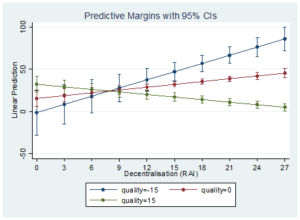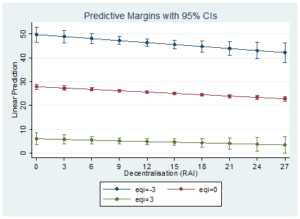The blog post is based on the article “Can decentralization help address poverty and social exclusion in Europe?” published in Territory, Politics, Governance. This research benefited from a Regional Studies Association Membership Research Grant (MeRSA) awarded to Vassilis Tselios.
More than 20% of the European Union (EU) population are at-risk-of poverty or social exclusion. Numerous policies have been implemented to reduce this terrible problem, but the entities responsible for such policies vary from country to country, and, in some countries, from one region to another. However, does the government tier handling poverty reduction and social exclusion affect the effectiveness of such policies? Are national or subnational governments more effective at addressing poverty concerns? The European Commission has indicated the importance of decentralized local governance for inclusive growth in a way that recognizes decentralization as an effective policy tool for poverty alleviation and social exclusion reduction. But, is this truly the case?

These are timely and important questions, as, despite an already lengthy trend towards decentralization across globe, our knowledge of how the greater powers and resources awarded to subnational tiers of government contribute to the reduction of poverty and social exclusion remains limited.
The pros and cons of (de)centralization as a way to reduce poverty and social exclusion greatly depend on a variety of factors. These include the capacity of subnational tiers of government to deliver adequately on this front, the quality of governance, and the variations in the incidence of poverty and social exclusion between urban and rural areas.
To address these questions we use poverty and social exclusion data from Eurostat, the Regional Authority Index (RAI) to proxy decentralization, the Worldwide Governance Indicators to proxy governance quality, and combine them in an econometric analysis. The results of the analysis indicate that decentralization is mostly connected with reductions in poverty and social exclusion, both within countries and regions. However, there are important caveats and differences in this relationship between the national and regional scale.
National versus regional scales
At the national scale, decentralization leads to lower levels of national poverty and social exclusion mostly in European countries with relatively high-quality governance (Figure 1), and fundamentally through its effect on poverty reduction in urban areas. Hence, in the Nordic countries, Austria, the Netherlands or Germany —where governance quality is well above average— decentralization can provide the right recipe for poverty alleviation. In countries such as Bulgaria, Croatia, Greece, Hungary, Italy or Romania, with a lower governance quality, it is unlikely to have the same effect. The quality of governance is far more important for addressing social problems than the level of autonomy of European regions, meaning that centralization may have a limited sway in addressing social problems across Southern and Eastern Europe.

Figure 1
At the regional level, the effect is more uniform. Greater local autonomy is fundamentally linked with lower poverty and social exclusion in all regions, regardless of their governance level (Figure 2). This implies that decentralization can lead to a greater responsiveness to the needs of the poor and the socially excluded within regions across the whole of Europe, although the aggregate impact at country level only emerges when we move up the governance quality scale.

Figure 2
The analysis gives new evidence, but also raises new questions about the potentially beneficial effects of decentralization for addressing the poverty and social exclusion problems that have gripped many areas of Europe in recent times. They also have practical implications for policymakers and regulators. Regional governments, because of their capacity to tailor public policies to local needs more adequately than when conducted at the national level, theoretically have the potential to engage in economic development and service activities that might reduce poverty and social exclusion and improve well-being. However, this potential is worth little if the governance ecosystem in which powers and resources are being decentralized is low quality.
Policymakers and regulators should recognize these limitations and actively intervene to improve institutional quality and build capacity. Only in these circumstances will decentralized governments become capable of contributing to alleviating urgent social problems, making decentralization a powerful tool to address poverty and social exclusion at an aggregate scale.

Vassilis Tselios is an Associate Professor of Regional Analysis and Policy at Panteion University of Social and Political Sciences. His research concerns regional development and growth, public and regional policy, decentralisation, inequalities, and disasters.

Andrés Rodríguez-Pose is the Princesa de Asturias Chair and a Professor of Economic Geography at the London School of Economics. He is the Director of the Cañada Blanch Centre LSE and a Visiting Professor at the Centre for Innovation Research, University of Stavanger, Norway. He has a long track record of research in regional growth and inequality, fiscal and political decentralization, institutions, discontent and populism, innovation, migration, and development policies and strategies.
Are you currently involved with regional research, policy, and development? The Regional Studies Association is accepting articles for their online blog. For more information, contact the Blog Editor at rsablog@regionalstudies.org.